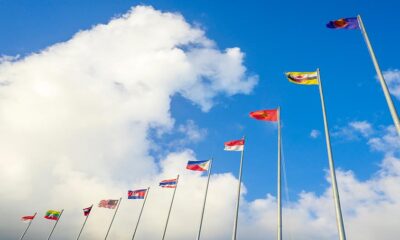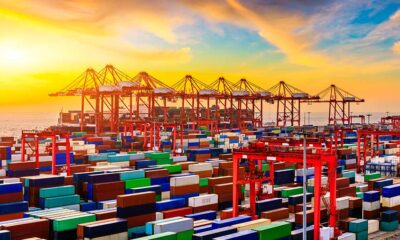China
Manila blasts China’s ‘unprovoked aggression’ in latest South China Sea incident

China’s coast guard on Saturday fired a water cannon at a Philippine supply boat in disputed waters in the South China Sea, causing “significant damages to the vessel” and injuring its crew, the Philippine coast guard said.
Manila was attempting to resupply troops stationed on a ship at the Second Thomas Shoal, known locally as Ayungin Shoal, when the Chinese coast guard and maritime militia “harassed, blocked, deployed water cannons, and executed dangerous maneuvers against the routine RoRe (rotation and resupply) mission,” said the Philippine National Task Force for the West Philippine Sea.
The West Philippine Sea is the part of the South China Sea that Manila claims as its jurisdiction.
The Chinese coast guard also set up “a floating barrier” to block access to shoal where Manila ran aground an old warship, BRP Sierra Madre, to serve as a military outpost.
The Philippine task force condemned China’s “unprovoked aggression, coercion, and dangerous maneuvers.”
Philippines’ RoRe missions have been regularly blocked by China’s coast guard, but this is the first time a barrier was set up near the shoal.
The Philippine coast guard nevertheless claimed that the mission on Saturday was accomplished.
Potential consequences
The Second Thomas Shoal lies within the country’s exclusive economic zone where Manila holds sovereign rights.
China, however, claims historic rights over most of the South China Sea, including the Spratly archipelago, which the shoal forms a part of.
A Chinese foreign ministry’s spokesperson on Saturday said the Philippine supply vessel “intruded” into the waters near the shoal, called Ren’ai Jiao in Chinese, “without permission from the Chinese government.”
“China coast guard took necessary measures at sea in accordance with law to safeguard China’s rights, firmly obstructed the Philippines’ vessels, and foiled the Philippines’ attempt,” the ministry said.
“If the Philippines insists on going its own way, China will continue to adopt resolute measures,” the spokesperson said, warning that Manila “should be prepared to bear all potential consequences.”
U.S. Ambassador to the Philippines MaryKay Carlson wrote on social media platform X that her country “stands with the Philippines” against China’s maneuvers.
Beijing’s “interference with the Philippines’ freedom of navigation violates international law and threatens a free and open Indo-Pacific,” she wrote.
Australian Ambassador to the Philippines Hae Kyong Yu also said that Canberra shares the Philippines’ “serious concerns about dangerous conduct by China’s vessels adjacent to Second Thomas Shoal.”
“This is part of a pattern of deeply concerning behavior,” Yu wrote on X.
Edited by Jim Snyder.
Read the rest of this article here >>> Manila blasts China’s ‘unprovoked aggression’ in latest South China Sea incident
Business
Business Update: Southern Sun Reports Earnings Growth; China Stimulates Property Market – News24

Southern Sun reports increased earnings, attributed to growth in the hospitality sector, while China’s property market receives a boost, reflecting economic recovery and renewed investor confidence.
Southern Sun Earnings Surge
Southern Sun has reported a significant increase in its earnings, showcasing solid financial performance amid evolving market conditions. This growth highlights the company’s resilience and adaptability to changing consumer demands, positioning it well for future opportunities in the hospitality industry.
China’s Property Market Recovery
In a bid to rejuvenate its economy, China has introduced measures to boost its property market. These initiatives aim to stabilize real estate prices and encourage investment, which is crucial for maintaining economic momentum. The government’s commitment to supporting the sector reflects its understanding of the industry’s importance in overall economic health.
Broader Economic Implications
The rise in Southern Sun’s earnings and China’s proactive approach to revitalizing its property market indicate broader economic trends. Investors and stakeholders are keenly observing these developments, as they may signal recovery and growth opportunities in both the hospitality and real estate sectors. The collaboration between local businesses and governmental actions will be pivotal in shaping future economic landscapes.
Source : Business brief | Southern Sun sees earnings rise; China boosts its property market – News24
China
Vietnam’s Approach to China: A Balance of Cooperation and Struggle
Vietnam’s diplomatic strategy seeks a balance of cooperation and struggle with China, focusing on strengthening ties while resisting encroachments in the South China Sea through military enhancements and regional partnerships.
Vietnam’s Diplomatic Strategy
Vietnam’s diplomatic approach seeks to maintain a delicate balance between cooperation and struggle with China. While concerned about China’s growing influence, particularly in the South China Sea, Hanoi focuses on strengthening its economic and political ties. This effort involves military enhancements, fostering relationships with regional powers, and engaging in frequent political dialogues. By skillfully navigating relations with major powers, Vietnam aims to protect its sovereignty and foster stability amidst evolving geopolitical dynamics.
Recent Developments and Implications
Hanoi’s diplomatic maneuvering has drawn attention, particularly regarding key visits like Vietnamese Communist Party General Secretary To Lam’s August 2024 trip to China. Although there are apprehensions about a potential shift in Vietnam’s alignment due to To Lam’s background in public security and his anti-corruption initiatives, it is premature to predict any significant changes in policy. Vietnam’s leaders must continuously seek a balance between peaceful coexistence with China and safeguarding national sovereignty.
Economic Interdependence and Military Modernization
Vietnam’s strategy involves fostering economic interdependence with China while simultaneously resisting encroachments. This paradigm of “cooperation and struggle” enables Hanoi to cultivate beneficial ties in economic, political, and security domains. By leveraging its geographical advantage and connections, Vietnam enhances its economic ties while countering threats through military modernization and cooperation with regional partners. This nuanced approach allows Vietnam to welcome trade, particularly amidst shifting dynamics from the US-China trade war, ensuring continued foreign direct investment and growth in key sectors.
Source : Cooperation and struggle define Vietnam’s approach to China
China
2025 Schedule of Public Holidays in China

China’s 2025 public holiday schedule increases holidays by two days, with an 8-day Spring Festival and a 5-day Labor Day. Adjustments address public frustration, though long work periods persist. Notably, weekends are often designated as workdays to balance extended breaks.
China has released its 2025 Public Holiday schedule. Compared to 2024, the number of public holidays for all citizens has increased by two days, specifically for Lunar New Year’s Eve and May 2nd.
The announcement also clarifies the adjusted holiday arrangements, stating that the continuous work period before and after statutory holidays generally should not exceed six days, except for certain special circumstances.
According to the notice, in 2025, the Spring Festival will have an 8-day holiday, the Labor Day holiday will last 5 days, and the National Day and Mid-Autumn Festival will jointly have 8 days off.
China has long been considered one of the least generous countries in terms of public holidays. Additionally, people have expressed frustration over the complicated adjustments to holiday and working days that are meant to create longer breaks. The newly introduced changes are expected to address these concerns to some extent.
Beyond the newly introduced changes, China’s 2025 public holiday schedule still features two major week-long holidays: Spring Festival (also known as Chinese New Year) and the National Day holiday (often called ‘Golden Week’).
In 2025, the Spring Festival falls between January 28 and February 4, and the National Day holiday, together with the Mid-Autumn Festival, fall between October 1 and 8.
Foreign human resource managers should note that Saturdays and Sundays are often marked as additional official workdays in China to compensate for long holiday breaks. For example, January 26 (Sunday) and February 8 (Saturday) are designated as workdays to partially offset the eight days off for the Spring Festival.
| This article was first published by China Briefing , which is produced by Dezan Shira & Associates. The firm assists foreign investors throughout Asia from offices across the world, including in in China, Hong Kong, Vietnam, Singapore, and India . Readers may write to info@dezshira.com for more support. |
Read the rest of the original article.






